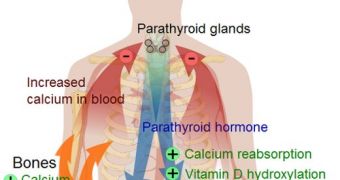Many healthcare experts urge their patients to increase their uptake of calcium if they want to have stronger bones. Theoretically, a higher amount of calcium in the organism is better for the health of hard tissues, but only when some conditions are met. That is to say, the mineral needs to be fixed to the bones, and the principal agent in charge of this process is vitamin D. Therefore, one could venture to say that balanced amounts of these two substances need to be present in the body at all times, or otherwise unpleasant side-effects occur, ScienceDaily reports.
For example, if the calcium uptake is very high, but is not supported by the necessary amounts of vitamin D, then the excess mineral would deposit itself on bones, or inside arteries and veins, stifling blood flows, and creating various structures on the bones. The new investigation was aimed precisely at understanding the interactions between there two chemicals. The work was partially supported through grant money secured from the Agricultural Research Service (ARS), and was conducted by a collaboration of scientists including experts from the Tufts University.
One of the coauthors of the research was TU Jean Mayer USDA Human Nutrition Research Center on Aging (HNRCA) expert and nutrition specialist Bess Dawson Hughes. The scientist underlines in the study that increased calcium levels in the human body are not always sufficiently-effective on their own in reducing bone fracture risks. Vitamin D is actively involved in a very large number of the chemical reactions calcium undergoes once ingested, and oftentimes it is an indispensable catalyst. In order to accurately assess the influence that calcium levels have on overall health, the team looked at some 10,000 men and women in a representative national survey. All the participants were at least 20 years old at the time the study started.
At this point, in the United States, the minimum recommended dosage of calcium uptake each day is around 1,200 milligrams, especially for adults that have passed the age of 50. The investigators highlight the fact that vitamin D is joined in its influence on calcium absorption by other factors as well, including smoking and the amount of daily exercise a person gets. In the research, it was demonstrated that, although many participants had inadequate calcium levels, the majority in fact needed more vitamin D in their bloodstream. The researchers concluded that this should be one of the primary goals of future public bone health awareness campaigns. Doctors should also take note, and always prescribe calcium and vitamin D together.

 14 DAY TRIAL //
14 DAY TRIAL //